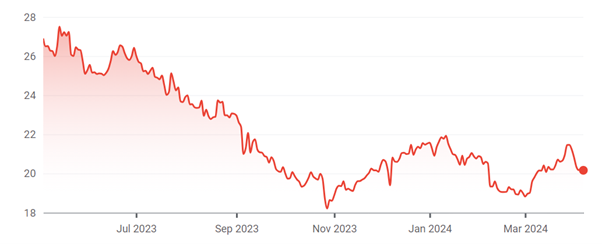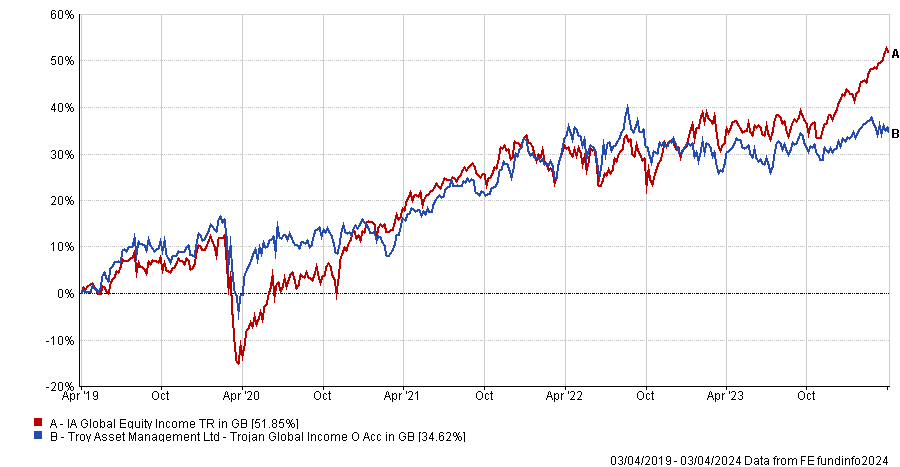With equity markets knocking up against all-time highs, could their next move be downwards? James Harries, who manages the £825m Troy Global Income fund, thinks this is a distinct possibility and believes an economic slowdown could be triggered by a couple of factors.
The first is the “long variable lag” after which interest rate hikes feed into the broader economy through higher mortgage rates and borrowing costs.
The second would be a dent in the sky-high expectations for US mega-cap technology stocks, if other companies do not adopt their artificial intelligence-related products and services as quickly as markets have priced in. “Maybe the expression ‘trees don’t grow to the sky’ at some point might be right,” he mused.
The ‘Magnificent Seven’ have become such a large component of global stock markets that if their valuations dip, it would have a knock-on impact on equity indices, he added.
Harries is preparing for a potential downturn in the “incredibly fully-valued equity markets” by researching which companies he would buy if their valuations were more reasonable. He wants to increase exposure to three areas: consumer cyclicals, non-bank financials and industrial cyclicals.
One consumer-facing business he would love to own is Starbucks, which has a “long growth runway” in China. “Coffee is less controversial than [computer] chips”, he said, so he does not expect Starbucks’ expansion plans in China to invite the same level of scrutiny that tech companies are facing.
If the global economy slows, cash-strapped consumers would be less likely to pay for expensive coffee, which would depress Starbucks’ share price, providing a buying opportunity.
Rentokil Initial – “a high quality global operation” – is also on Harries’ radar. It acquired Terminix in the US in 2022 and has just snapped up HiCare Services Private, the second-largest pest control company in India.
Climate change and warmer summers are causing pests to become more of a problem, increasing demand for Rentokil’s services. Rentokil is also a play on wealth creation in emerging markets; “one thing you do as you move up the income ladder is have effective pest control,” he said.
Harries is also keen to increase his exposure to non-bank financials that are not highly levered, such as BlackRock. He described the asset management giant as “a high-quality proxy on capital markets”.
In industrials, Harries has his eye on Fastenal, which distributes nuts and bolts in the US. Industrials tend to fall out of favour during economic slowdowns, which might present an opportunity to add exposure, he said.
As well as compiling his wish list, Harries has been adding to his portfolio in real time.
In the past few weeks, he started building a position in Pernod Ricard, the second-largest spirits business in the world and the owner of Jameson Irish Whiskey and Absolut Vodka. Pernod has a significant emerging market footprint and a “huge runway for growth,” he said. Whiskey is popular in India and Chinese consumers are developing a taste for cognac.
Demand for spirits soared during the Covid lockdowns and slumped thereafter, causing Pernod Ricard’s share price to tail off, providing a buying opportunity.
Harries also added Canadian National Railway Company (CN) to the fund in October 2023. In North America, rail is primarily used to move commercial goods and is a lower carbon alternative to road transport – a significant advantage as companies increasingly build the cost of carbon into their forecasts, he explained.
Consumer healthcare company Kenvue, whose portfolio of brands includes Tylenol, Calpol and Band-Aid, is another new entrant. It was spun out of Johnson & Johnson (which the fund also owns) in May 2023 in an exchange offer, whereby Johnson & Johnson shareholders received Kenvue shares – which many of them sold, causing Kenvue’s share price to plummet.
Following the spinout, Kenvue has benefitted from greater focus and productivity, and more prominence for its brands. Kenvue has an average 6% free cash flow yield and a 4% dividend yield.
Kenvue share price performance over 1yr

Source: Google Finance
The Troy Global Income fund treads a cautious path, with Harries aiming to deliver a reliable income to his investors, many of whom are retired, while avoiding capital losses.
As such he owns a lot of “dull but worthy” branded consumer goods powerhouses and has avoided the Magnificent Seven – except for Microsoft, which he has owned since 2013 – because they do not pay sufficient dividends. “We are the ying to that yang. People can get Magnificent Seven exposure from lots of places – not from us,” he said.
The flipside to this steady eddy approach is that during “optimistic” markets such as the present environment, “we look quite pedestrian” and the fund has underperformed. “We’re in optimism squared at the moment because we’ve got a very expensive late cycle market with an AI cherry on top,” he observed.
Performance of fund vs sector over 5yrs

Source: FE Analytics
Harries argues that investors in or approaching retirement should consider taking some of the exponential gains they have made from large-cap equities, especially US tech stocks, and reinvesting that wealth to secure a long-term income stream. “The better the markets perform, the less focussed on income people are,” he lamented.





